I took the decision to leave about eight hours before we were due to go - around 11pm on Tuesday night. In the end it just felt like I wasn't doing anyone a favour by staying, all (well, almost all of them) my Lebanese friends were telling me to go and be safe, and so was everybody I know in Germany. So I decided to do it, even though it felt particularly nasty to be leaving as part of a 'green light' the international community was giving Israel by evacuating its citizens from Lebanon. 'Once we're out, you can go ahead with the real stuff' may have been the logic, or maybe it was Israel contacting European governments and telling them, 'guys, you've got 48hours to get your people out of there'.
That's what the German airforce crew on our evacuation plane were speculating anyway, they were saying that the really short notice for evacuating Germans was probably due to the fact the German government hadn't been planning on doing this until they got a definite call from Israel.
It was a really long journey until we got on that plane in Turkey though. First we had to assemble at 7am outside the BIEL conference venue in the port of Beirut. After queuing for three hours in the already unbearably strong sunshine with about 1,000 others, we were told that the first batch of buses had gone and that we should come back in a couple of hours. By this point, several people had fainted and one person had been severely injured because they were squashed against the separation barrier where several Lebanese army and German embassy staff were checking everyone had a German passport. There were definitely not enough embassy people around to inform people what was going on - they had one guy with a megaphone shouting 'everyone will get on a bus', but somehow he didn't manage to get through to the majority of people. Besides, all this was hard to believe in the midst of the pushing, fighting for space, the heat and the occasional outbreak of panic anyway. People panicked out of worry they wouldn't be able to get on a bus, or that they would get separated from friends or family. All the children and babies were crying because of the heat and stress, parents were losing their nerve - and all of this got worse when Israeli planes bombed a storage facility in Achrafiyeh, near Sodeco, about 5 mins by car behind us.

Anyway, I had made it right to the front and was literally standing in front of the separation barrier when they closed it and told everyone the next buses would be arriving in two hours' time. A lot of people were jumping the barrier at this point, with the Lebanese guards letting them be. One man came running and pushing up to the barrier with his two kids in his arms, furious and sweaty, and shoved them into the arms of one of the soldiers guarding the barrier. 'I want my kids to get out, do something' he shouted at the soldier, who told him to calm down and behave and handed the kids back across the barrier.
It felt a bit stupid to actually turn back from the gate like a civilised person, considering that everyone else was of the view that by this time, everything counted to get out and breaking the rules was o.k. and jumping the barrier was in order. But that's what I did anyway, I remember thinking for better or worse... I came back after two hours and most of the morning crowd were gone then - buses started arriving from Sidon in the South carrying more evacuees, who at this point had already been on the road for 4-5 hours with their lives in danger from Israeli bombardment. Accordingly, they were even more stressed than people had been in the morning. There were a lot of fights after we got through the barrier and had to wait for another hour or two in the sun, just to catch a shuttle bus to the main conference centre (a distance of about 500 metres). They wouldn't allow us to walk there, and for this purpose had armed German security guards on call. Next to us, the Canadians seemed to be evacuating people at a much faster pace, sending more buses and pickups...
After I finally made it to the conference centre and registered with the German embassy staff (more waiting of course), I had to wait in a huge hangar, bare apart from a lot of plastic chairs, with my fellow evacuees, i.e. about one to two thousand people. Even the German ambassador was helping with the registration, but by this point nobody was surprised about anything anymore. The majority of us were to be taken by bus to Damascus, but as I was waiting to register, an embassy person had asked me if I was willing to travel to Turkey instead. They had negotiated another evacuation route through Syria and to Turkey and were asking anyone not travelling with small children to take that road, because of the longer bus ride.
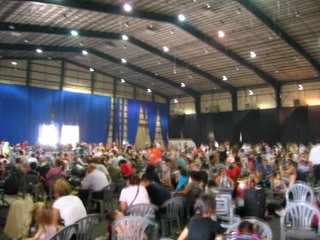
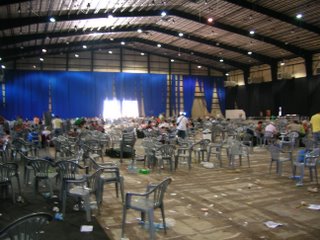
Unfortunately our bus convoy was the last to leave, at about 7p.m., so we had quite a long wait... there was no food anywhere, except a few lunch boxes which we suspected were left over from the Canadians, and of which my new-found traveling companion managed to get her hands on a few. But then they had told us to bring food to last for 24 hours, along with our ten kilo evacuation allowance...
Once we got on the way, in a strangely surreal dusk with a beautiful sunset - surreal because all the roads were deserted where they would normally have been bustling on a weekday night - everyone started to relax a little. It almost felt like we were taking a road trip, except that things remained strangely tense, and with every major industrial facility we passed (refineries, fuel storages, etc. - and there are a lot of them on that road), people held their breath a little. You never know.
And then there were the fights: we made one stop on our four-hour trip to the border to buy some food and use the bathroom, and there were lots of fights in the queue: 'I was first!' 'No, you bitch, I was!!'. And between grown-up people, mind you. So much for the road trip feeling.
At some point in the middle of the night we got to the Lebanese-Syrian border. I was by this time listening to music on my discman to escape the hectic feeling of the bus and the arguing and the noise. All of a sudden I could hear a strange sound, and people on the bus began to panic. There had been bombing really close to us, two explosions. We were waiting at the border crossing for our passports to be stamped then, and suddenly all the cars around us turned out their lights, people started panicking and running and speeding to the border - on foot, in cars, a minibus full of families had broken down and some of the passengers were desperately trying to push it across the border, to the Syrian side, to safety. The soldiers at the crossing started screaming at us to get the hell out of there with our buses (potential targets, after all the Israelis had already bombed some tour buses in the previous days, saying that they might carry Hizballah weapons), and the people who had gotten off the bus for a cigarette just had time to jump back on before our driver tore up the bumpy road and crossed the border, which the guards had opened to let everyone through. Once on the other side, we had to wait for about three hours, because our passports along with a German army guy accompanying us had been left at the border crossing post.
These three hours were the most terrible part of the journey. We were waiting, we didn't really know what was going on, and people still kept passing us, whole families coming across the border barefoot, carrying the kids and a few belongings. Everyone kept telling us to get out of there because they were bombing close-by. The rumour started circulating that the bombs had targeted the village we had just passed through, and had destroyed the road, cutting the only land route out of Lebanon. It was an agonising wait then, all I could think about were the Lebanese friends who had been planning to take that road the next day, and who would now be unable to leave. I desperately wanted to know if it was really true, but as rumours go there was no way of knowing for sure. And who was I to ask or to share those worries with? My fellow passengers had mostly been through hell at this point, one guy kept telling us over and over how his village close to the Israeli border had been bombed into the ground, and how he had spent the past four days without sleep, pulling bodies from the rubble of destroyed houses, putting extra fridges into the hospital morgue because there were too many bodies...
Finally the army guy reappeared with our passports, and we got back on the bus and into the 'calm' of journeying through relatively safe Syria. The panicking had really taken a toll on everyone's nerves though, and somewhere near Aleppo a big family feud broke out on my bus, with several women going at each other with their high-heeled shoes as attack weapons, and the men unable to separate them. This whole affair delayed our journey by another half hour or so. Early in the morning we were roused from sleep (at least I was) and told to get all our stuff and change onto another bus. At some point we stopped at a hotel, already inside Turkey, to get some food and eat their nice breakfast buffet, but I wasn't hungry at all actually. I remember desperately trying to ask the waiter for a fork, but he didn't understand what I wanted to tell him. A German TV crew had already been flown in to meet us there, and started interviewing people about the journey and about how well (or badly) the German embassy had been managing the evacuation. It all felt really surreal. I didn't want to speak to or see anyone. Strangely, there was a really nice and completely empty jacuzzi-swimming pool thingy which I found while wandering around the hotel, and I would have loved taking a swim in there, but my fear of getting left behind by the bus was stronger.
We continued our journey through the amazingly beautiful scenery of South-East Turkey, which nobody was taking much notice of anymore, but it definitely added to the trip in some way. At Adana airport, the final stop of our 20-hour bus ride, there were more television crews and more waiting. We could already see the German airforce plane waiting for us on the runway, but for some reason it took them a few hours to sort everything out and let us on. A coke at the only snack bar in the waiting lounge cost 4 US dollars, a definite dissuasion.

Finally on the plane, we were greeted by seats much wider and much more comfortable than on a commercial airliner, and instead of air hostesses there were soldiers pushing around little trolleys with food and drink. They even served tomato juice (why does everyone drink that on the plane, anyway?!). Evacuation heaven!
And then we had at last made it to Cologne airport, and by then the German authorities apparently were feeling thoroughly bad about all the negative press they'd been getting. All of a sudden there were all these people to take care of us, medics, counsellors, railway employees to help organise onward journeys.... We were a bit surprised, considering all the official company we'd had on the journey had consisted in our German army escort, who by the end had become quite dear to us and vice-versa, and who said his farewell to each and every one of us as we got on the plane (he turned right back around to accompany the next convoy to Turkey).
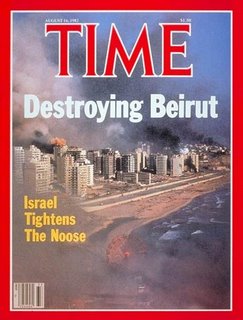



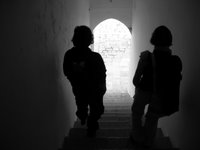
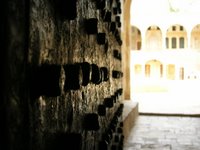

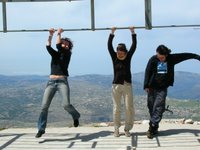
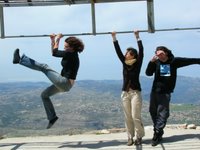
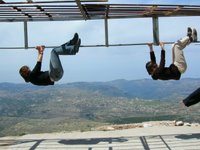
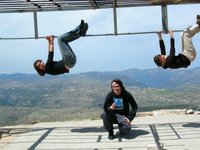
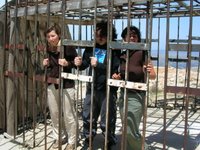


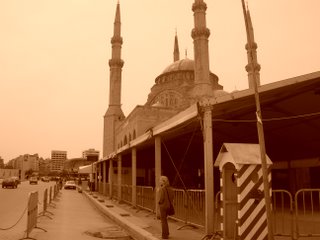




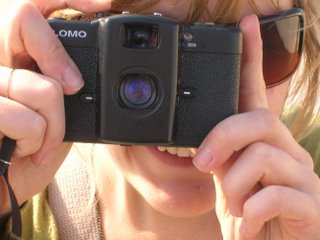








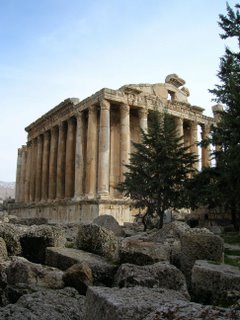





 I still had fun though because Tripoli has a lot of souks and looks a bit like Damascus or Aleppo - very different from East Beirut. Somehow, I was relieved to discover this and to know that there actually are Muslim communities in Lebanon; something that is easily forgotten when you live and work in a Christian neighbourhood, like I do. Getting lost in the network of souks is a lot of fun, and like in Damascus there are different sections: a clothes section, a fruit and veggie section, a meat section, a jewelry section, and of course, a tacky-crap-section! After I spent some time in the clothes section unsuccessfully looking for a pair of rubber boots and warm socks because my shoes were seriously soaked after crossing the above river-street, I settled for a pair of stuffed-animal slippers in the shape of lions from the tacky-crap-section, because at least that way my feet would be warm once I got home. This proved to be a good calculation and I cannot describe my joy at wearing the brand new lion slippers after a day of slushing through muddy water in trainers! Luckily there is so much to distract the senses in the souks that I didn't notice it so much. There are tons of little Madrassas with black and white stonework, and Khans (storage rooms) from several centuries ago, and incense and tea and the sweets that Tripoli is famous for....I bought some from an old man in a little shop - they're the best. And of course there's the castle, which I will have to visit next time since it's basically a lot of ruins under the sky and I wasn't up for that in the rain. Anyway I'm definitely going back, it's a really nice day trip.
I still had fun though because Tripoli has a lot of souks and looks a bit like Damascus or Aleppo - very different from East Beirut. Somehow, I was relieved to discover this and to know that there actually are Muslim communities in Lebanon; something that is easily forgotten when you live and work in a Christian neighbourhood, like I do. Getting lost in the network of souks is a lot of fun, and like in Damascus there are different sections: a clothes section, a fruit and veggie section, a meat section, a jewelry section, and of course, a tacky-crap-section! After I spent some time in the clothes section unsuccessfully looking for a pair of rubber boots and warm socks because my shoes were seriously soaked after crossing the above river-street, I settled for a pair of stuffed-animal slippers in the shape of lions from the tacky-crap-section, because at least that way my feet would be warm once I got home. This proved to be a good calculation and I cannot describe my joy at wearing the brand new lion slippers after a day of slushing through muddy water in trainers! Luckily there is so much to distract the senses in the souks that I didn't notice it so much. There are tons of little Madrassas with black and white stonework, and Khans (storage rooms) from several centuries ago, and incense and tea and the sweets that Tripoli is famous for....I bought some from an old man in a little shop - they're the best. And of course there's the castle, which I will have to visit next time since it's basically a lot of ruins under the sky and I wasn't up for that in the rain. Anyway I'm definitely going back, it's a really nice day trip.
